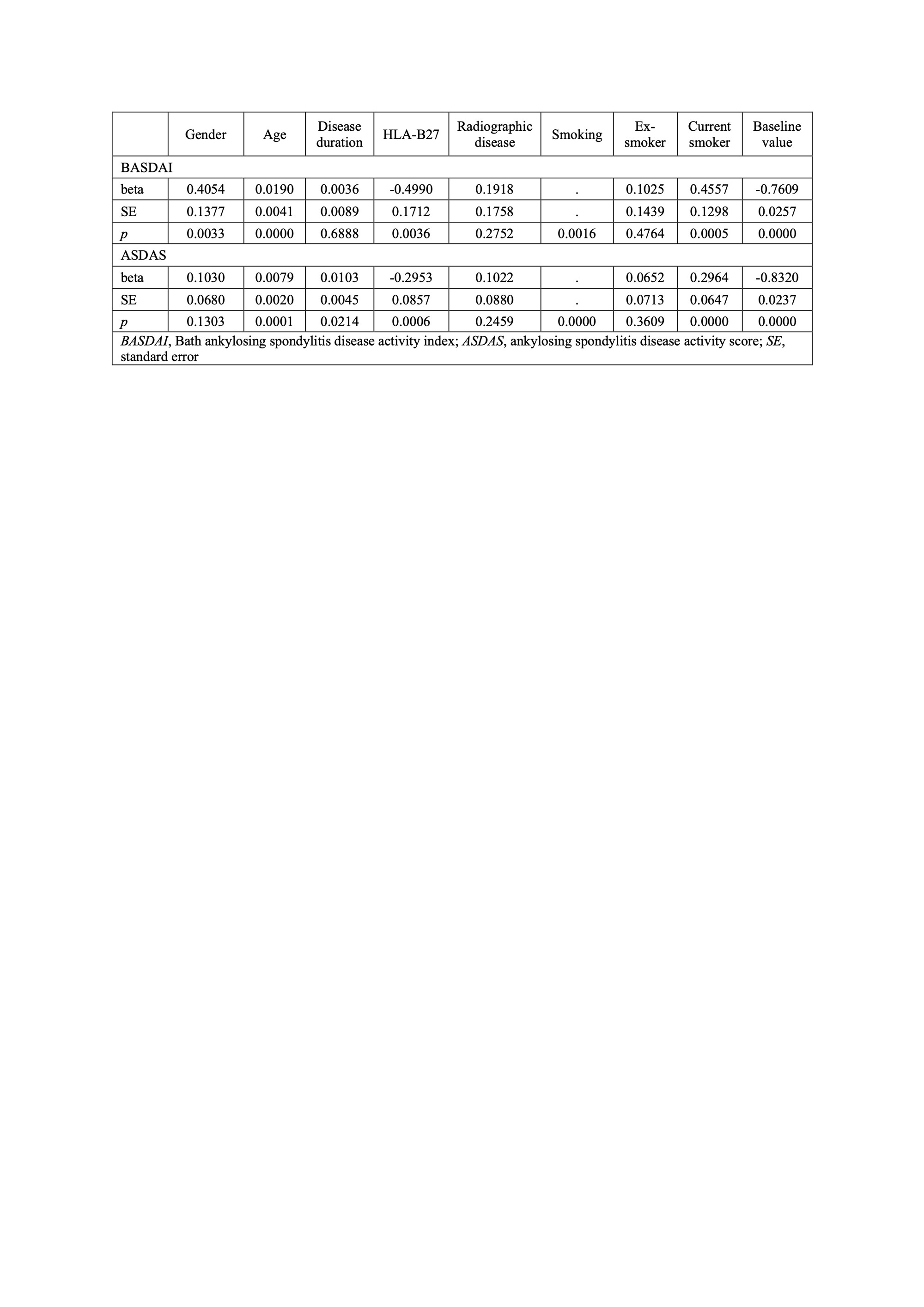Session Information
Session Type: Poster Session C
Session Time: 9:00AM-11:00AM
Background/Purpose: The assessment of disease activity in axial spondyloarthritis (axSpA) heavily relies on patient-reported outcomes. It is well-established that gender can influence these outcomes. Accordingly, our study aimed to investigate gender-based differences in disease activity scores before and after treatment with biologic disease-modifying antirheumatic drugs (bDMARDs).
Methods: We conducted a retrospective analysis utilizing data from the Korean College of Rheumatology Biologics therapy (KOBIO) registry, encompassing axSpA patients treated between December 2012 and August 2021. We compared the Bath Ankylosing Spondylitis Disease Activity Index (BASDAI) and Ankylosing Spondylitis Disease Activity Score (ASDAS) at the initial visit after commencing bDMARDs between male and female patients. Generalized linear model analyses were performed to assess the relationship between changes in disease activity scores and gender with the correction of other clinical variables.
Results: A total of 1,753 patients (1,343 males and 410 females) were included in the analyses. Baseline characteristics revealed that male patients were younger, exhibited longer disease duration, and had a higher proportion of HLA-B27 positive and radiographic disease cases. Additionally, male patients presented lower BASDAI scores and higher C-reactive protein (CRP) levels. At the first follow-up visit (after an average duration of 11.2 months from the initial visit), a significantly greater proportion of male patients achieved a BASDAI score < 4 compared to female patients (79.57% vs. 71.54%, p < 0.0010). However, there were no significant differences between genders in the proportion of patients achieving low disease activity (ASDAS < 2.1) or inactive disease (ASDAS < 1.3) in terms of ASDAS disease activity score (71.14% vs. 71.5%, p = 0.8892; 38.82% vs. 39.44%, p = 0.8265, respectively). After adjusting for baseline clinical information, a statistically significant association was observed between gender and the difference in BASDAI scores between the first follow-up visit and baseline (p = 0.0033, Table 1). Conversely, no significant relationship was found between gender and the difference in ASDAS scores (p = 0.1303, Table 1).
Conclusion: Our findings highlight the potential impact of gender on the interpretation of treatment response to bDMARDs in axSpA, emphasizing the need to consider diverse methods of calculating disease activity when assessing therapeutic outcomes in male and female patients.
To cite this abstract in AMA style:
Lee S, Kang S, Kim H, Lee J, kim J, Koh E, Cha H. Gender Disparities in Disease Activity Scores and Treatment Response Among Patients with Axial Spondyloarthritis [abstract]. Arthritis Rheumatol. 2023; 75 (suppl 9). https://acrabstracts.org/abstract/gender-disparities-in-disease-activity-scores-and-treatment-response-among-patients-with-axial-spondyloarthritis/. Accessed .« Back to ACR Convergence 2023
ACR Meeting Abstracts - https://acrabstracts.org/abstract/gender-disparities-in-disease-activity-scores-and-treatment-response-among-patients-with-axial-spondyloarthritis/

